21 start with M start with M
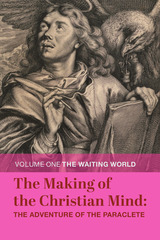
This is not a history of dogma or systematic account of the building of doctrine. It is a narrative that follows the major moments wherein the Christian heart so in tune with the Paraclete has rendered the seminal texts and literature of this new culture, from the Didache to the Rule of Saint Benedict and The Consolation of Philosophy. Patrick succeeds in presenting a narrative that reads more like the experience lived by those directly involved in its realization, and although he cannot include every individual accomplishment of the major Christian writers, he illuminates the context in which Christianity was born and how faith grew and allowed itself to be shaped by its participation in the “adventure” and its grasp of objective truth. The Christian mind is, says Patrick, not only inspired and moved by the restless Paraclete, but revolves around the event of Jesus Christ. Christian history is therefore best understood not simply as chronology of events but as the vision of “the new heart in time,” one that strives to be like that of the one who sent the Spirit into history.
Patrick writes with a voice of a teacher, and although this work is very well referenced and accurate he does not intend this work to be a scholarly presentation of data and careful arguments, nor does he include every aspect of this intellectual faith journey of Christianity found in writing. As a comprehensive review, Patrick acknowledges the limitations of his own project to tell a complete story. Nevertheless, The Making of the Christian Mind accomplishes the no less formidable feat of illustrating the vivacious quality of the authentic Christian intellectual life. “Christianity is a survivor, not because it possessed the instruments of power but because, as Jesus of Nazareth said before Pilate, the foundation of the Kingdom is truth, its instruments of conquest are its renewing gifts, its consequences are the substitution of truth for error and ignorance, of faith for skepticism, humility for pride, and of charity and friendship for emulation, all this realized never perfectly but always as possibilities having the power to make all things new.”
This work is divided into three volumes, of which the present work is the first. Highlights of this first volume, The Waiting World, include following revelation as it first moved uncertain hearts to write and then to offer explicit witness. In this first installment, Patrick sets the groundwork for following the faith and history of Israel to Justin Martyr’s great claim that what is true belongs to Christians.
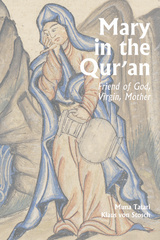
An entire chapter (surah) is dedicated to her, and she is the only woman mentioned by name in the Qur’an—indeed, her name appears more frequently than that of either Muhammad or Jesus. From the earliest times to the present day, Mary, the mother of Jesus, continues to be held in high regard by Christians and Muslims alike, yet she has also been the cause of much tension between these two religions.
In this groundbreaking study, Muna Tatari and Klaus von Stosch painstakingly reconstruct the picture of Mary that is presented in the Qur’an and show how veneration of the Blessed Virgin Mary in the Roman Catholic Church intersects and interacts with the testimony of the Qur’an. This sensitive and scholarly treatise offers a significant contribution to contemporary interfaith dialogue.

The German Romantic theologian and philosopher Schleiermacher wrote, "The virtuosity (or special calling) of a person is at the same time the melody of that person's life, and it remains a simple, meager series of notes unless religion, with its endlessly rich variety, accompanies it with all notes and raises the simple song to a full-voiced, glorious harmony." It is around this melody that Jaroslav Pelikan, a great theologian of our own day, weaves the polyphonic threads of philosophy, theology, morals, history, and personality to create a singular portrait of his life and work.
The Melody of Theology is really two books in one: a dictionary in which a reader can browse through piquant explorations of some of the most interesting topics in Christian theology, and an intellectual autobiography in which Jaroslav Pelikan has used those topics to give an account of the traditions to which he owes the formation of his own mind and spirit. As he says, "An intellectual autobiography in the format of a 'philosophical dictionary' permits the self-indulgence of employing the seeming objectivity of some eighty-two entries, arranged in the impersonal sequence of alphabetical order, to express a completely personal set of prejudices."
Among the large topics addressed in this volume are the Bible, Faith, Grace, Reformation and Renaissance, and Sin. Among the towering figures of religion and theology are Dante, Ralph Waldo Emerson, Erasmus, Gibbon, Martin Luther, Paul the Apostle, and Schleiermacher. Among the technical topics analyzed are Apocatastasis, Christian Creeds, the term "Ecumenical," Eschatology, Patristics, and the Trinity. The Melody of Theology belongs on the bookshelf of anyone who wants to study a history and tradition that precede us and will continue after us, and also of the reader who would like to make the acquaintance of a subtle analytic mind and a generous open heart.
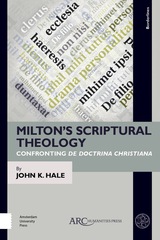
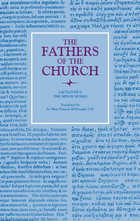

The first English translation of the earliest Latin poems about miracles performed by the Virgin Mary, composed in twelfth-century Canterbury by a Benedictine monk who inspired Chaucer.
Nigel (ca. 1135–1198), a Benedictine monk at Christ Church in Canterbury, is best known for The Mirror of Fools—a popular satire whose hero Burnellus the Ass is referenced in Chaucer’s Canterbury Tales. Nigel’s oeuvre also includes other important poems and hagiography.
The Miracles of the Virgin is the oldest Latin poem about miracles performed by Mary. This collection features seventeen lively tales in which the Virgin rescues a disappointed administrator from a pact with the devil, has a Roman emperor killed by a long-dead martyr, saves a Jewish boy from being burned alive, and shields an abbess from the shame of pregnancy. Each story illustrates the boundlessness of Mary’s mercy. In the Tract on Abuses, a letter that resembles a religious pamphlet, Nigel rails against ecclesiastical corruption and worldly entanglements.
Alongside authoritative editions of the Latin texts, this volume offers the first translations of both works into English.

With an equal emphasis on every word in the title—and with a distinctly American perspective—Himes and his distinguished associate editors and contributors, have assembled the most thorough and authoritative assessment of modern Roman Catholic social teaching to date, likely to remain the touchstone volume for decades. This culmination of many years of effort by twenty stellar scholars has produced a reference work for anyone interested in understanding or studying the key documents that comprise the central corpus of Catholic social teaching.
In addition to interrogations of the major documents, this volume provides an understanding of the biblical and philosophical foundations of Catholic social teaching, addresses the doctrinal issues that arise in such a context, and explores the social thought leading up to the "modern" era, generally accepted as beginning in 1891 with the publication of Pope Leo XIII's Rerum Novarum. Finally, there is a review of how Catholic social teaching has been received in the United States, and an informed look at the shortcomings and questions that future generations must address.
By any standard, Modern Catholic Social Teaching is a remarkable work—intellectually rigorous and deeply faithful, it provides accessible and thought-provoking insights into the heart of a belief tradition that every Catholic will find invaluable.

Including contributions from twenty-two leading moral theologians, this volume is the most thorough assessment of modern Roman Catholic social teaching available. In addition to interrogations of the major documents, it provides insight into the biblical and philosophical foundations of Catholic social teaching, addresses the doctrinal issues that arise in such a context, and explores the social thought leading up to the "modern" era, which is generally accepted as beginning in 1891 with the publication of Pope Leo XIII's Rerum Novarum. The book also includes a review of how Catholic social teaching has been received in the United States and offers an informed look at the shortcomings and questions that future generations must address. This second edition includes revised and updated essays as well as two new commentaries: one on Pope Benedict XVI's encyclical Caritas in Veritate and one on Pope Francis's encyclical Laudato Si'. An outstanding reference work for anyone interested in studying and understanding the key documents that make up the central corpus of modern Catholic social teaching.
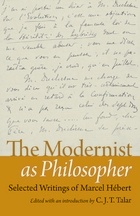
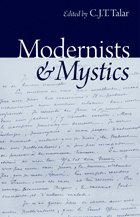
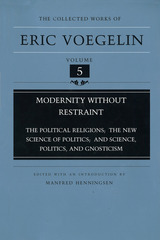
Published together for the first time in one volume are Eric Voegelin's Political Religions, The New Science of Politics, and Science, Politics, and Gnosticism.Political Religions was first published in 1938 in Vienna, the year of Voegelin's forced emigration from Austria to the United States. The New Science of Politics was written in 1952 and established Voegelin's reputation as a political philosopher in America. Science, Politics, and Gnosticism was Voegelin's Inaugural Lecture at the University of Munich in 1958 and introduced him to the West German intellectual public.
Although these books were written during remarkably different historical circumstances of Voegelin's life, all three present an analysis of modern Western civilization that has lost its spiritual foundations and is challenged by various ideological persuasions. Voegelin critiques in these texts a "modernity without restraint." It is a modernity with Hegelian, Marxian, Nietzschean, Heideggerian, positivist, Fascist, and other predominantly German characteristics. The author confronts this modernity with Western meaning as it emerged in ancient Greece, Rome, Israel, and Christianity and became transformed in the European Middle Ages, the Italian Renaissance, and the Anglo- American political formation.
This three-in-one volume delves into the intellectual and spiritual complications of modernity, tracing its evolution from the ancient civilizations to the twentieth century. In his substantial new introduction, Manfred Henningsen explores the experiential background that motivated Voegelin's theoretical analyses and the new relevance that his work has gained in recent years with the unexpected collapse of state socialism in East Germany, Eastern Europe, and the Soviet Union. Modernity without Restraint will be a valuable addition to intellectual history and Voegelin studies.

Conventional wisdom would have it that believing in one God is straightforward; that Muslims are expert at monotheism, but that Christians complicate it, weaken it, or perhaps even abandon it altogether by speaking of the Trinity. In this book, Muslim and Christian scholars challenge that opinion. Examining together scripture texts and theological reflections from both traditions, they show that the oneness of God is taken as axiomatic in both, and also that affirming God's unity has raised complex theological questions for both. The two faiths are not identical, but what divides them is not the number of gods they believe in.
The latest volume of proceedings of The Building Bridges Seminar—a gathering of scholar-practitioners of Islam and Christianity that meets annually for the purpose of deep study of scripture and other texts carefully selected for their pertinence to the year’s chosen theme—this book begins with a retrospective on the seminar’s first fifteen years and concludes with an account of deliberations and discussions among participants, thereby providing insight into the model of vigorous and respectful dialogue that characterizes this initiative.
Contributors include Richard Bauckham, Sidney Griffith, Christoph Schwöbel, Janet Soskice, Asma Afsaruddin, Maria Dakake, Martin Nguyen, and Sajjad Rizvi. To encourage further dialogical study, the volume includes those scripture passages and other texts on which their essays comment. A unique resource for scholars, students, and professors of Christianity and Islam.
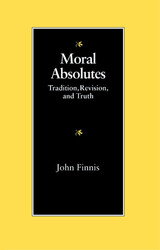

Comprehensive in its approach yet written in plain language, The Moral Bond of Community offers a biblically-based concept of Christian justice that can be applied to moral questions in everyday life.
Brady examines four forms of Christian moral discourse — narrative, prophetic, ethical, and policy — and shows how each contributes to a fuller understanding of Christian morality.

In this collection of recent essays (1988-92), all but one previously unavailable in English, noted theologian Josef Fuchs, SJ, examines key issues in normative morality. Identifying two strains, one based on natural law and a more situational one based on the Golden Rule, he explores the need for plurality in both individual and societal ethics, and the problem of universal versus only general validity. Central ideas that Fuchs develops are the concept of innovative morality as the individual's responsible search for God's will in personal situations; and the significance of the conscience in the face of official statements by the church's magisterium. Among the topics he considers are marriage and sexuality; the beginning and end of life; and international solidarity and social justice.
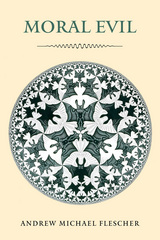
The idea of moral evil has always held a special place in philosophy and theology because the existence of evil has implications for the dignity of the human and the limits of human action. Andrew Michael Flescher proposes four interpretations of evil, drawing on philosophical and theological sources and using them to trace through history the moral traditions that are associated with them.
The first model, evil as the presence of badness, offers a traditional dualistic model represented by Manicheanism. The second, evil leading to goodness through suffering, presents a theological interpretation known as theodicy. Absence of badness—that is, evil as a social construction—is the third model. The fourth, evil as the absence of goodness, describes when evil exists in lieu of the good—the "privation" thesis staked out nearly two millennia ago by Christian theologian St. Augustine. Flescher extends this fourth model—evil as privation—into a fifth, which incorporates a virtue ethic. Drawing original connections between Augustine and Aristotle, Flescher’s fifth model emphasizes the formation of altruistic habits that can lead us to better moral choices throughout our lives.
Flescher eschews the temptation to think of human agents who commit evil as outside the norm of human experience. Instead, through the honing of moral skills and the practice of attending to the needs of others to a greater degree than we currently do, Flescher offers a plausible and hopeful approach to the reality of moral evil.

Pope John Paul II is the second longest serving pope in history and the longest serving pope of the last century. His presence has thrown a long shadow across our time, and his influence on Catholics and non-Catholics throughout the world cannot be denied. Much has been written about this pope, but until now, no one has provided a systematic and thorough analysis of the moral theology that underlies his moral teachings and its astonishing influence. And no one is better positioned to do this than Charles E. Curran, widely recognized as the leading American Catholic moral theologian.
Curran focuses on the authoritative statements, specifically the fourteen papal encyclicals the pope has written over the past twenty-five years, to examine how well the pope has addressed the broad issues and problems in the Church today. Curran begins with a discussion of the theological presuppositions of John Paul II's moral teaching and moral theology. Subsequent chapters address his theological methodology, his ethical methodology, and his fundamental moral theology together with his understanding of human life. Finally, Curran deals with the specific issues of globalization, marriage, conscience, human acts, and the many issues involved in social and sexual ethics.
While finding much to admire, Curran is nonetheless fiercely precise in his analysis and rigorously thoughtful in his criticism of much of the methodological aspects of the pope's moral theology—in his use of scripture, tradition, and previous hierarchical teaching; in theological aspects including Christology, eschatology, and the validity of human sources of moral wisdom and knowledge; and in anthropology, the ethical model and natural law. Brilliantly constructed and fearlessly argued, this will be the definitive measure of Pope John Paul II's moral theology for years to come.

Joseph Cardinal Bernardin of Chicago was for twenty years the most influential U.S. Catholic bishop; he was also a beloved public figure whose views commanded respect from Catholics and non-Catholics alike. This posthumous collection of a number of his major addresses on central moral issues in contemporary American life voices the causes that were closest to his heart: the sanctity and protection of all human life, the reshaping of American society and institutions for the benefit of the poorest, the preservation of peace in the pursuit of justice, and the growth of mutual understanding and harmony within the Church.
Spanning the period from the early 1980s to just weeks before his death in late 1996, these essays demonstrate a remarkably sustained and thoughtful effort to articulate an overall framework for moral decisions — "a consistent ethic of life" — and to affirm an active role for religious convictions in a pluralist democratic society. Cardinal Bernardin applies the Church’s moral and social teachings to complex policy issues in a way that respects religious freedom and invites both reflection from Catholics and dialogue with people of other beliefs.
Written in a clear and accessible style, this volume will be of value to everyone interested in Cardinal Bernardin’s moral vision for political choices. It will also be important for a wide range of readers concerned with in Christian ethics and the role of religion in the public sphere.
Joseph Cardinal Bernardin (1928-1996) served as the archbishop of Chicago from 1982 to 1996 and as archbishop of Cincinnati from 1972 to 1982. He was made a cardinal by Pope John Paul II in 1983 and received the Presidential Medal of Freedom in 1996 for his contribution to American civic life. He wrote The Gift of Peace (Loyola University Press, 1997).
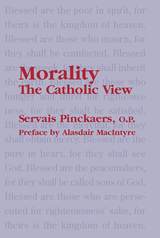
“As Alasdair MacIntyre notes in the preface, the work of Pinckaers attracted strong
and fully justified notice in this country with the publication in English of his The
Sources of Christian Ethics. As Pinckaers himself notes in the text, excellently translated
by Michael Sherwin, the interest should in no way be limited to Roman
Catholics. Morality recasts the earlier book in an argument that is both lower and
upper case ‘catholic,’ and is accessible to readers and teachers outside the limited
circle of moral theologians and academic ethicists. Pinckaers contends that
Christian morality is not first of all about obligations but about happiness, understanding
that the happiness of union with God is our natural destiny made possible
by grace. The Sermon on the Mount is at the center of an approach to morality
that turns on the distinction between ‘freedom for excellence’ and ‘freedom of
indifference,’ the former understood as human flourishing and the latter as a ‘neutral’
capacity to choose between controversies. The proposal of Morality is thoroughly
Christ-centered, humanistic, and faithful to the magisterial teaching of the
Church. Warmly recommended.”
First Things
“If you want to have the experience of reflecting on Catholic morality as though
you were reading about it for the first time, treat yourself to Father Servais
Pinckaers’ Morality: The Catholic View. He has recovered the classical view of the
moral life as the quest for happiness and has presented it with disarming simplicity.
Bringing us back to the Sermon on the Mount and Romans 12–15, the writings
of Augustine and Aquinas, and the theme of natural law, he has freed those texts
from the layers of legalism which has hidden their liberating, spiritual powers for
moral living. By distinguishing freedom of indifference from freedom for excellence,
he has restored a wise vision of freedom. No one has shown better the role
of virtues as building blocks for morality. Catechists need to read this book.”
Rev. Alfred McBride, O.Praem., Professor of Homilectics and Catechetics at Blessed
Pope John XXIII Seminary, Weston, Massachusetts
“Father Pinckaers has given us a masterful exposition of Christian living. The clarity
and brevity of his presentation – captured well by the translator – make this book
ideal for classroom and parish use.
“Readers will find the historical and systematic observations very informative.”
Romanus Cessario, St. John’s Seminary, Brighton, Massachusetts

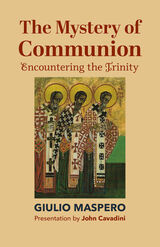
An approach to Trinitarian theology often favors overly technical language, or undue triteness. Maspero succeeds in leading both scholar and student to see how the unfolding of the mystery of the Trinity and its dogmatic development is a discovery of the “mystery from which all true love flows” in history. This discovery is only possible because of God’s self-revelation and immanence––that is, his heart and his “within.” The revelation of his being wholly and eternally Father and Son and the Love between them has made a more complete unity know to humanity through the perfect unity of divine communion. The foundation of all being and reality is this communion of love, personal unity that is given in relation and not in spite of relation. After a career of studying theology and theoretical physics, Maspero is especially keen on emphasizing the radical nature of this concept. It is an extension of Greek philosophy but ripped open and assigned immeasurable new value in communion and relation.
The brevity of this work limits the amount of citations and textual references given, and Maspero instead urges the reader to study the book alongside Scripture. His manner of writing respects the impossibility of speaking of God in his immanence, but he nonetheless carves out a place for the Trinity in the human intellect, a place where the Jewish and Christian God might be encountered. As Maspero observes, truth is found in the personal dimension, but “just as in the use of a map for a journey, the cognitive grasp of the Trinity is to prevent us from getting lost, to keep us from reducing and simplifying the Trinity into something we understand merely on a natural level.” A highlight of this work is Maspero’s reliance on Mary, Theotokos, in his presentation of Trinitarian theology, the person who first opened herself to this manner of thinking.
READERS
Browse our collection.
PUBLISHERS
See BiblioVault's publisher services.
STUDENT SERVICES
Files for college accessibility offices.
UChicago Accessibility Resources
home | accessibility | search | about | contact us
BiblioVault ® 2001 - 2024
The University of Chicago Press









